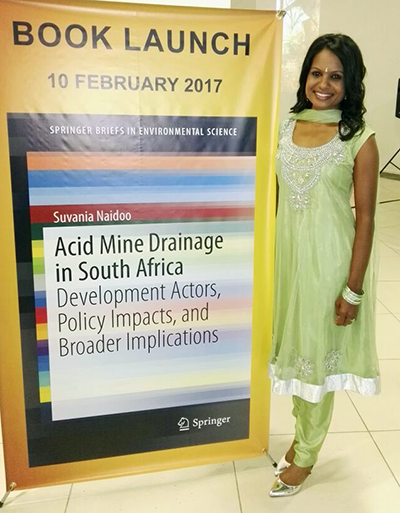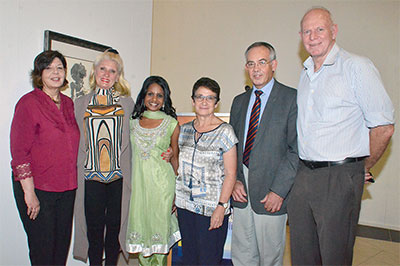
The African college of excellence in the social and human sciences

Unisa academic Suvania Naidoo (Lecturer: Development Studies) is the author of Acid mine drainage in South Africa: Development actors, policy impacts and broader implications
The launch of Acid mine drainage in South Africa: Development actors, policy impacts and broader implications, by Suvania Naidoo, took place on 10 February 2017. The book has proven to be a timely publication because of the incipient water crisis in South Africa. The event was hosted by Unisa’s Department of Development Studies in the College of Human Sciences. The guests were welcomed by the chair of the department, Prof Gretchen du Plessis, who expressed that “development studies is an ever-changing discipline and is a space where different issues converge”. She further stated that the book fills a void in our knowledge about acid mine drainage (AMD) and that the publication is “an example of hard work which results in big achievements”.
This publication is the culmination of the findings of the research conducted for Naidoo’s master’s dissertation. The book focuses on assessing the responses of the various development actors involved in addressing the issues of AMD, and its socio-economic and developmental implications. Prof Dirk Kotzé, from the Department of Political Sciences at Unisa and programme director for the event, said that AMD research is generally analysed from highly technical, engineering, and natural science perspectives. He also said that the purpose of the publication was to identify and explain the different conceptual understandings of AMD and its implications. Kotzé acclaimed the publication as being one of the few cases where a social science approach successfully ventures into the domain of the natural sciences.
Naidoo uses sustainable development and, specifically, environmental sustainability as the departure for this research, which is directly linked to water and food security. She said the book concentrates on AMD as “a phenomenon in water management in South Africa and its potential impact on sustainable development, as well as mining and the quality of water in South Africa and the impacts of AMD”.
She emphasised that one of the most important contributions of her research is conceptual in nature and said “the manner in which AMD is defined determines how it is assessed as a water management, environmental, and social problem. It also means that the response to AMD is determined by how it is defined by government”. Naidoo highlighted that, while the South African government has made strong and valuable attempts to address the issues surrounding AMD, the conclusions of her research showed that there was no clear indication in policy as to what the socio-economic impacts caused by AMD are, and how they should be responded to.
Keynote speaker, Mariette Liefferink, CEO of the Federation for a Sustainable Environment, and a leading activist in this field, provided a detailed account of the historic and contemporary context of AMD. She alerted the audience to a significant fact that AMD dates as far back as 1903. She used a more current example to illustrate the impact of AMD on South Africa’s water systems by explaining how the problem of AMD in the West Rand Basin, Gauteng, was left untreated for almost 10 years. She said the immediate short-term treatment of AMD only commenced in 2012 and said that a feasibility study for the long-term treatment of this phenomenon was conducted in 2013 at a cost of R25m. Liefferink said that the long-term treatment plan for AMD was launched on 18 May 2016 but would only be implemented by 2020. She warned that this might have a significant impact on water security. She stressed that academics who employ their research for the benefit of society should be applauded and endorsed Naidoo’s publication as having a definite economic and social value impact.
Zachary Romano, editor at Springer, New York, via a pre-recorded video, said: “Suvania’s research was a perfect candidate for our SpringerBriefs edition, in Earth Sciences, Geography and Environment at Springer Nature. This series is targeted at publishing interdisciplinary case-studies that speaks to larger issues, particularly from young researchers with promising careers. As South Africa’s water systems are under much stress from climate change and pollution already, this is a timely document and we are confident that many academics and professionals will find it to be a great resource”. He also said that the book proposal was reviewed by several leaders in the field, all of whom were impressed by the final product. He further mentioned that the publisher is looking forward to future collaborative work with Naidoo.
The event was extremely well-attended by key stakeholders and experts in this field.

Prof Gretchen du Plessis (CoD: Development Studies), Mariette Liefferink (CEO: Federation for a Sustainable Environment), Suvania Naidoo (Lecturer: Development Studies), Prof Linda Cornwell (Director: School of Social Sciences), and Dr Tony Turton (water resource management expert)
*Submitted by Wilmont Gertse
Publish date: 2017-02-16 00:00:00.0